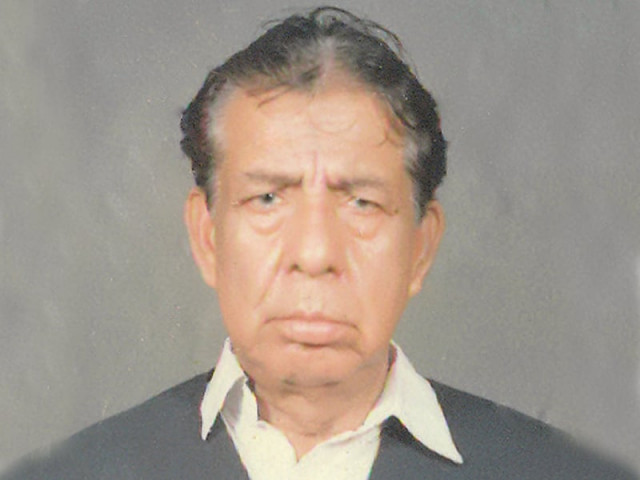Remembering a pioneer: A lawyer who fought his whole life to get compensation for others
Advocate Maqsood Ahmed fought several cases to get money for families of traffic accident victims.

Advocate Maqsood Ahmed PHOTO COURTESY: FAMILY
In fact, Ahmed is known as the pioneer of compensation litigation. On his 12th death anniversary, his 48-year-old son, Advocate Nasir Maqsood, shares his story.
“My father started practice in mid 1970s but, after a couple of years, he stopped looking for potential clients,” Maqsood recalled. “Instead, he spent his days and nights persuading the legal heirs of poor people who died in road accidents to file lawsuits claiming damages from negligent motorists.”

Ahmed was the first lawyer in town to file such cases, and his continued focus made him excel in this particular kind of litigation - the law of tort. Till his death in September 2001, he had managed to secure monetary compensation for hundreds of victims.
“In the 1970s nobody even knew that a law, called Fatal Accidents Act 1855, exists to claim damages in case of such accidents,” said the son, who is also engaged in this kind of litigation. “Neither the lawyers nor the judges were very aware of it.” The one-and-a-half century-old law gives people a right to claim damages from private individuals and government functionaries, who are found responsible for any loss of life or damages to limbs by negligence.
Ahmed practised this law for 24 years and his list of clients swelled remarkably as families came to seek compensation for their loved ones who left them before their time. Today, his two sons are carrying his legacy forward by pursuing nearly 200 cases for the victims lost in traffic accidents, air crashes, drowning, medical malpractice, etc.
No loss, no profit
These lawyers’ war goes on the ‘no profit, no loss’ basis. The law firm files cases on behalf of the victims’ relatives who pay professional fees for litigation, once they receive compensation by the defendants. “I feel sorry to see lawyers contest cases of criminals, such as dacoits, rapists and murderers but no one ever bothers to raise a voice for the poor and the needy,” said Advocate Aamir Maqsood, Ahmed’s youngest son. “It’s like giving a hope to those who have no hopes.”
Delayed justice
The Maqsoods might have gained the fame of being the only law firm specialising in compensation cases but several of their cases are still pending in courts for many years, complained several of their clients. The defendant parties opt to prolong the litigation instead of helping the poor, they explained. Muhammad Sajid’s father was allegedly killed by a rashly-driven National Logistics Carrier (NLC) trailer-truck in 1995, when he was only 18 years old. “I had to handle the wedding expenses for my three sisters and four brothers,” said the 42-year-old, whose family suffered heavily after the father’s untimely death. “Today, I’m the father of three as well,” Sajid added, as an afterthought.
Several other families share similar stories in which the negligent drivers are neither ready to admit their guilt nor willing to extend any help. Taj Muhammad’s father was also killed by the defunct Karachi Transport Company’s bus in the 1990s. The company might have earned millions or billions till it was disbanded over the years but it failed to pay Rs1 million in damages claimed by his family.
“My father died when I was only six years old - the eldest among five siblings,” said Muhammad, who is 20 now. “In 2001, our mother also died from lungs’ failure and we did not inherit any property or bank balance.” The family is still awaiting compensation, which has yet to come nearly two decades later.
Hesitant families
Ahmed’s son Nasir, who has around 200 cases reported in the law books to his credit, admitted that very few families approach the courts to seek compensation after accidents. There is a lack of awareness among people and some amendments to the law are necessary, he felt.
“The time to file a compensation case is fixed one year under the law, which must be extended to at least two years, as is done in the US, UK and other countries,” he explained. “In most cases, the victims are married so their widows spend a few months in iddat [period of waiting]. Then they take more time making up their minds because those accepting compensation are looked down upon by their own relatives.”
Despite the odds, the Maqsood brothers continue to carry on their father’s work. “During a full court reference held for our father one of the judges remarked: ‘Maqsood’s death is less a loss for his family and more for the hundreds of widows and orphaned children, whom he might have helped in the future’.”
Published in The Express Tribune, November 11th,2013.



















COMMENTS
Comments are moderated and generally will be posted if they are on-topic and not abusive.
For more information, please see our Comments FAQ